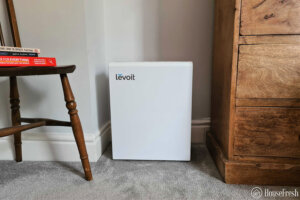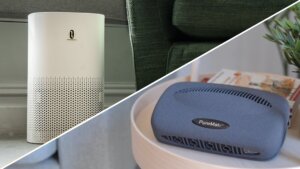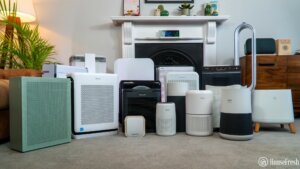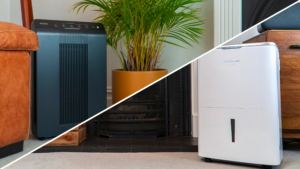Wondering how long you should run an air purifier? The simple answer is that you aim for at least 8-12 hours of daily runtime.
But, if you want the best air quality possible, run your air purifier 24/7. This will maintain the air in your home and remove all contaminants as soon as they appear.
On average (depending on your air purifier’s CADR score), an initial cleaning of a room takes the average purifier about 45 minutes to 3 hours.
But contaminants won’t be removed from your home forever by a single cleaning. You need to keep your unit running to maintain clean air, as pollutants keep returning.
Why you should consider sleeping with your air purifier on
Running the air purifier while you sleep ensures eight hours of quality breathing. As such, it may help your sleep rather than hinder it.
Here are three reasons why running your unit could benefit your sleep sleep:
1. Clean air reduces snoring
Allergens in the air can irritate the upper airways and increase allergy symptoms, causing blockages. Any blockage or inflammation in the oral or nasal passageways can result in snoring.
Even if you live alone, snoring can negatively impact your sleep quality— whereas if you have a partner, it can also affect theirs. A constant flow of clean, fresh air can reduce these symptoms and help to minimize snoring.
2. White noise helps you sleep
White noise generated by an air purifier can aid sleep. As discovered in a 2005 study, white noise also has a masking effect on other noises that disturb a person’s sleep due to their abrupt nature. Therefore, white noise is helpful to people living in places that are “too quiet” or overly noisy.
Air purifiers create a white noise level of around 40dB through the motor running and blowing air and the noise stays at a constant level — making it an ideal sound for sleeping.
3. Nice, fresh smells improve sleep quality
Air purifiers are a great way to reduce odors within the house. Removing odors from the bedroom can help improve sleep by making the sleeping environment more comfortable.
A poll conducted by the National Sleep Foundation found that 71% of people reported better quality sleep on fresh, nice-smelling sheets.
The cost of running an air purifier 24/7
It’s understandable to be concerned about running any device at all hours. After all, what about electricity usage?
Luckily, most air purifiers, even larger models, use very little power.
Though it varies depending on the individual machine, you’re unlikely to find a purifier that will make any noticeable impact on your electricity bill, even when it runs 24/7.
- Air purifiers contribute less than 1% to household energy consumption. That’s only about 12% of the energy harnessed to run a fridge.
- You can expect to pay around $22 annually to power an air purifier, with an average daily consumption of 15W.
You should also think about filter replacements. A HEPA filter for home use will usually last about six to twelve months, while activated carbon filters can last anywhere from 3 months to 5 years. Both will need replacing at some point, so be sure to research the costs for your specific unit.
Final thoughts
Running your purifier for 24 hours a day will produce the best possible results. The power cost of running most air purifiers is negligible, and there are no real dangers from leaving your machine on for as long as you want.
This is especially true in homes with a lot of pollutants, or if you have asthma or allergies. We hope this article has helped you figure out how long you should run your air purifier for.
SOURCES
- Cooper, E. et al. (2021). Use Of Portable Air Purifiers In Homes: Operating Behaviour, Effect On Indoor Pm2.5 And Perceived Indoor Air Quality. sciencedirect.com
- Riedy S.M et al. (2021). Noise As A Sleep Aid: A Systematic Review. sciencedirect.com
- Sleep Foundation. (2023). Bedroom Poll: Summary of Findings. sleepfoundation.org
- Solomon, S.G, Kohn, A. (2014). Moving Sensory Adaptation beyond Suppressive Effects in Single Neurons. sciencedirect.com
- Stanchine, M.L et al. (2005). The Influence Of White Noise On Sleep In Subjects Exposed To ICU Noise. sciencedirect.com






